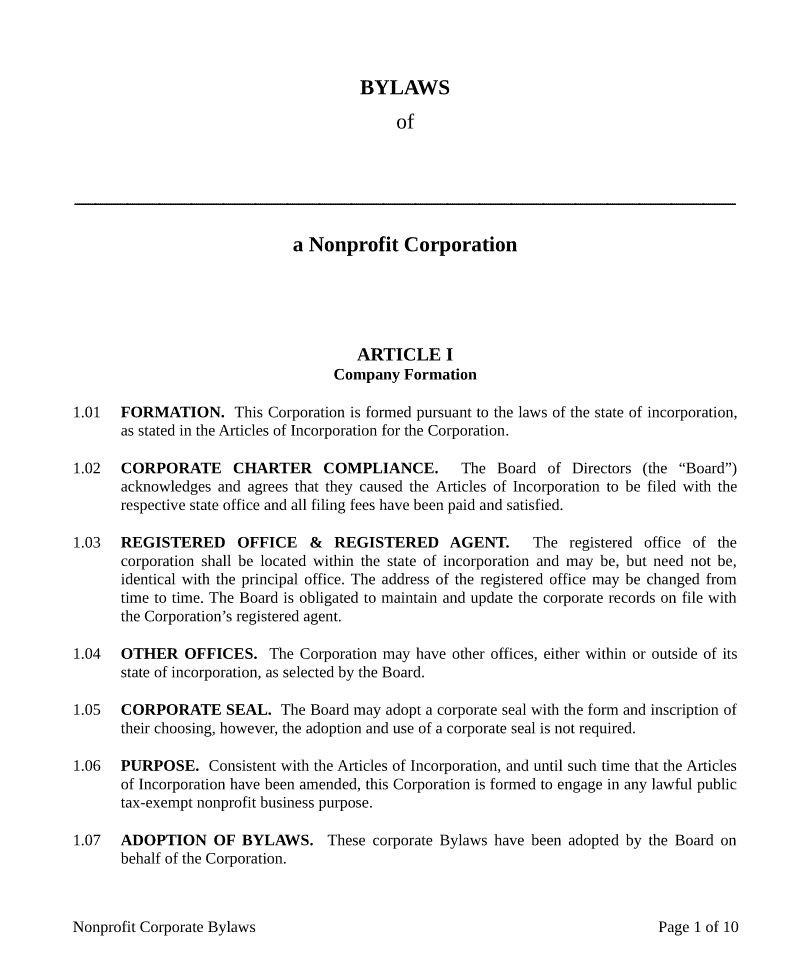Alaska Nonprofit Bylaws
Your Alaska nonprofit bylaws are your blueprint for governing your business. Bylaws help keep your company running smoothly and allow you to resolve internal conflicts quickly by dictating what actions to take in specific circumstances, such as electing and removing board members and officers, holding meetings, voting, record keeping, and more.
To help ensure your bylaws pass muster, begin with our attorney-drafted nonprofit bylaws template.
Why does an Alaska nonprofit need bylaws?
Unlike your Alaska Nonprofit Articles of Incorporation, you don’t need to file your nonprofit bylaws with the Alaska Department of Commerce, Community, and Economic Development. However, bylaws are still an essential part of your formation process, and they serve to protect the rights of those involved in running your organization. Additionally, you will need to produce copies of your bylaws for financial purposes, such as applying for tax-exempt status or a bank account. Read more about the importance of Alaska nonprofit bylaws below.
1. Nonprofit bylaws are legally required in Alaska.
According to AK Stat § 10.20.056, a nonprofit’s board of directors “shall adopt the initial bylaws of a corporation.” In legalese, “shall” is the equivalent of “must,” so adopting bylaws is legally mandated by the state of Alaska.
2. Third parties will ask to see your bylaws.
If you request 501(c)(3) tax-exempt status from the IRS, you’ll need to attach a copy of your bylaws to your application. Banks and other financial organizations also typically require copies of your bylaws to open bank accounts or apply for funding. You may also be asked to include copies of your bylaws on grant applications.
3. Nonprofit bylaws allow you more control over your nonprofit.
While Alaska state law lays out some guidelines for governing your nonprofit in the Alaska Nonprofit Corporations Act, your bylaws tailor this information to your organization’s particular culture and needs. Your bylaws ensure that your company can effectively handle internal disputes over governance or procedures. Without procedures for dealing with disputes in place, internal clashes between board members or officers could become legal battles to determine who was in the right. Not only are such conflicts costly, but they also open up your organization to scrutiny by the state.
Want to learn more? Check out our Guide to Nonprofits.
What do Alaska Nonprofit Bylaws include?
The bylaws for your Alaska nonprofit should consist of basic information about your nonprofit and the exact procedures for how it is governed. Your bylaws should clearly outline governance rules so that your board of directors can act quickly and confidently in situations where leadership or other significant changes need to be made. Here’s an overview of what rules to include:
- announcing and holding board meetings
- voting and quorum procedures
- electing and removing board members or officers
- compensating members
- serving or receiving legal notices
- dealing with conflicts of interest
- keeping accounting and meeting records
- amending your bylaws
- dissolving your nonprofit
Are nonprofit bylaws legally binding?
Yes. When your board of directors adopts your bylaws, they agree to rules set out by the document and are thus legally bound to follow these rules. In fact, if anyone working for your nonprofit—one of the directors, an officer, or an employee—breaches your bylaws, there could be adverse legal consequences for your nonprofit as a whole.
Are nonprofit bylaws public record?
Yes and no. You are not required to file your bylaws with the Alaska Department of Commerce, Community, and Economic Development. However, if you seek 501(c)(3) tax-exempt status with the IRS, your bylaws will become public. You will need to attach a copy of your bylaws to your application, and the IRS will make all 501(c)(3) applications public. Additionally, many nonprofits choose to publish their bylaws to increase transparency and accountability to the community they serve.
FAQs
There is no legal requirement for your board of directors to sign your bylaws. However, having your board members sign your bylaws is standard practice. It also indicates that everyone involved with setting up your nonprofit is in agreement about the direction of the organization and is therefore highly recommended.
Yes. When you draft your bylaws, you should include provisions for updating them. Review your bylaws regularly to ensure that they continue to meet your nonprofit’s needs. When you need to update, follow the rules laid out by the bylaws themselves.
Your bylaws should be adopted at your nonprofit’s initial organizational meeting by either the board of directors or your nonprofit’s incorporators.
In Alaska, one subset of the nonprofit organization is the Nonprofit Community Association. This type of nonprofit is designed to provide civic funding to communities that are not part of a municipality or other organization that can accept state funds on the community’s behalf. Forming a Nonprofit Community Association allows such communities to receive state funds and grants to provide services and support projects for community members. An example of this might be a Native village council.
Bylaws for Nonprofit Community Associations are very similar to regular nonprofit bylaws. However, there are a few key differences. Nonprofit Community Associations have a more expansive member base than typical nonprofits because all community members are considered members of the association. For this reason, we recommend that you refer to the Alaska Division of Community and Regional Affairs’ Nonprofit Community Association Handbook, which contains sample Nonprofit Community Association bylaws in Appendix B.
